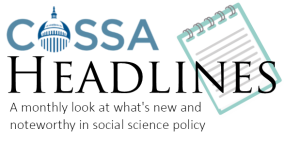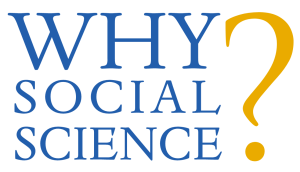Issue 07 (March 31)
COSSA Washington Update, Volume 39 Issue 7
Featured News
- COSSA Compiles Social Science Resources Related to COVID-19
- COSSA’s Analysis of Enacted COVID-19 Supplemental Funding Legislation, FY 2020
- April’s Headlines Webchat to Feature Deep Dive on Social Science During the Coronavirus Crisis
- Census Bureau Temporarily Suspends 2020 Field Operations, In-Person Survey Interviews
- NSF Creates Resource Webpage for Information on COVID-19
- Notable COVID-19 Resources
COSSA in Action
- Anthropologist Bill Maurer Answers “Why Social Science?”
- Read COSSA’s 2019 Annual Report
- Letters & Statements
Congressional News
Federal Agency & Administration News
- NIH Seeks Revision Applications to Support Firearms Injury Research
- France Córdova Finishes Term as NSF Director; Timeline for Confirming New Director Unclear
- NSF Releases Report on Social Science Doctoral Recipients
- Nomination Opportunities
- Funding Opportunities
- Notices & Requests for Comment
- Recent Reports
- Fellowships & Professional Development
Community News & Reports
COSSA Member Spotlight
COSSA Compiles Social Science Resources Related to COVID-19
COSSA is compiling a list of resources for social scientists and stakeholders related to the COVID-19 pandemic. The list includes guidance from federal science agencies, collections of publicly available peer-reviewed research related to the crisis, resources from COSSA member associations, and more. It will be updated frequently; if you would like to share resources for inclusion, please contact us.
There are a number of new databases for researchers wishing to amplify their work that may have relevance to the current crisis, including the COVID-19 Open Research Dataset, supported by the Allen Institute for AI, and a grassroots effort on GitHub to compile new social science research related to COVID-19. COSSA also encourages any social scientists sharing their work on these platforms to send it to COSSA to help us explain to policymakers the impacts of our sciences on crises like this.
COSSA’s Analysis of Enacted COVID-19 Supplemental Funding Legislation, FY 2020
Over the past month, Congress has passed three large stimulus bills in response to the COVID-19 pandemic. Together, the three bills comprise the largest economic stimulus package in American history and touch nearly all aspects of American life, including scientific research, support for key economic sectors and small businesses, direct financial support to Americans, and boosts to social safety net programs. All three bills enacted in response to the crisis, so far, have been supplemental appropriations bills, meaning they provide funds to federal agencies and programs in addition to what has already been appropriated for the current fiscal year (FY 2020), which began on October 1, 2019. It remains to be seen how this infusion of funds will impact, if at all, appropriations for next fiscal year (FY 2021), beginning on October 1, 2020. Follow COSSA’s FY 2021 coverage here.
The House of Representatives and Senate are in recess until further notice. Still, Congress is expected to consider additional stimulus legislation in the months ahead. Read on for COSSA’s summary of the three bills that have been enacted so far.
April’s Headlines Webchat to Feature Deep Dive on Social Science During the Coronavirus Crisis
 COSSA members are encouraged to sign up for the monthly Headlines webchat on Thursday, March 12. The COSSA team will break down the most important social and behavioral science news from the past month, including how the coronavirus pandemic has affected infrastructure and operations at science agencies, organizations, and universities. As always, COSSA staff will be standing by to answer your questions. Individuals employed by or affiliated with a COSSA member organization or university can register for the webchat here.
COSSA members are encouraged to sign up for the monthly Headlines webchat on Thursday, March 12. The COSSA team will break down the most important social and behavioral science news from the past month, including how the coronavirus pandemic has affected infrastructure and operations at science agencies, organizations, and universities. As always, COSSA staff will be standing by to answer your questions. Individuals employed by or affiliated with a COSSA member organization or university can register for the webchat here.
Census Bureau Temporarily Suspends 2020 Field Operations, In-Person Survey Interviews
The Census Bureau has announced further adjustments to its planned 2020 decennial census operations in response to the coronavirus epidemic (see previous coverage). On March 18, Census Director Steven Dillingham announced a two-week suspension of 2020 field operations. In addition, the Bureau’s two major facilities in Jeffersonville, IN, the National Processing Center and Paper Data Capture Center East, have dramatically reduced on-site staff to the minimum necessary to continue operations. These measures were further extended by an additional two weeks, through April 15, and could be extended even longer in accordance with public health guidelines. In addition, the Census Bureau has temporarily suspended in-person interviews for its ongoing surveys, including the American Community Survey. Where possible, field workers will call participants and seek to collect information by phone. This marks the first major interruption for some of these surveys in over 50 years of data collection.
At the same time, the Census Bureau is strongly encouraging all American households to respond to the 2020 Census online—both for convenience and to minimize in-person contact. The questionnaire can be filled out here—even households who have not received or lost their Census ID code can respond by clicking “if you do not have a Census ID, click here.” The Census Bureau has also published a response rate map, updated daily, that allows users to see the self-response rate in their state, city, or census tract.
NSF Creates Resource Webpage for Information on COVID-19
The National Science Foundation (NSF) has established a resource webpage compiling relevant information about NSF activities addressing the COVID-19 novel coronavirus. Some of the resources available on the webpage include a FAQ about NSF awards, a document describing NSF’s implementation of an Office of Management and Budget (OMB) directive, a Dear Colleague Letter inviting research proposals through the Rapid Response Research (RAPID) program, and a list of NSF deadlines that have changed due to COVID-19. This resource page is frequently updated to include the most relevant and accurate information.
In addition, on March 30, leadership from the Social, Behavioral and Economic Sciences Directorate (SBE) circulated a letter to the social and behavioral science community providing additional details on NSF’s COVID-19 resources and encouraging proposals from SBE fields.
Read COSSA’s 2019 Annual Report
COSSA’s 2019 Annual Report is now available. Check it out to learn more about COSSA’s activities and successes over the past year. Find out how your organization can become a member of COSSA on our website.
Anthropologist Bill Maurer Answers “Why Social Science?”
 The latest Why Social Science? post comes from Dr. Bill Maurer, an anthropologist and Dean of Social Sciences at the University of California, Irvine, who writes about how anthropology contributes to our understanding of the impacts of financial systems and technologies on people around the world, especially in times of global pandemic. Read it here and subscribe.
The latest Why Social Science? post comes from Dr. Bill Maurer, an anthropologist and Dean of Social Sciences at the University of California, Irvine, who writes about how anthropology contributes to our understanding of the impacts of financial systems and technologies on people around the world, especially in times of global pandemic. Read it here and subscribe.
House Science Committee Leaders Introduce Artificial Intelligence Legislation
On March 12, Chairwoman Eddie Bernice Johnson (D-TX) and Ranking Member Frank Lucas (R-OK) of the House Science, Space, and Technology Committee introduced the National Artificial Intelligence Initiative Act of 2020 (H.R. 6216). The legislation intends to accelerate and coordinate federal investments and facilitate new public-private partnerships in research, standards, and education in artificial intelligence, to ensure the United States leads the world in the development and use of responsible artificial intelligence systems. The legislation includes many opportunities for agencies to support research on the social and behavioral dimensions of artificial intelligence and emphasizes the importance of understanding the social, ethical, and economic implications of artificial intelligence. The legislation has a bipartisan group of original cosponsors, including Representatives Jerry McNerney (D-CA), Pete Olson (R-TX), Dan Lipinski (D-IL), and Randy Weber (R-TX). The full text of the legislation and a one-page description can be found on the Science Committee’s website.
NIH Seeks Revision Applications to Support Firearms Injury Research
The National Institutes of Health (NIH) has released a Notice of Special Interest soliciting competitive revision applications to programs that could potentially include firearms injury and mortality prevention research. This notice comes in the wake of NIH receiving $12.5 million dollars for research studying firearms injury and mortality prevention in the fiscal year (FY) 2020 Appropriations bill (see COSSA’s analysis). Like all federal agencies, NIH is legislatively restricted from using its funding for certain activities such as advocating for gun control policies, but is able to fund research topics aiming to understand the underlying risk factors and variables. Topics cited by the NIH notice as within the permitted scope of research include:
- Improving the ability to identify at-risk individuals for firearm injury and mortality;
- Developing healthcare procedures to accurately screen for risk of firearm injury and mortality;
- Understanding factors that are associated with firearm injury and mortality risk and resilience;
- Developing evidence-based interventions to address risk; and
- Assessing the public health and criminal justice systems’ approaches towards the reduction of firearm injury and mortality.
Revision applications will be accepted through May 15, 2020. More information is available on the NIH website.
France Córdova Ends Tenure as NSF Director; Timeline for Confirming New Director Unclear
National Science Foundation (NSF) Director France Córdova finished her six-year term as the head of the agency on March 31, 2020. Córdova, an astrophysicist and former Vice Chancellor for Research at the University of California at Santa Barbara, served as NSF Director since 2014. A farewell message from Córdova to NSF staff is available on the NSF website.
In January 2020, the White House announced the nomination of Sethuraman Panchanathan to succeed Córdova as NSF Director (see COSSA’s previous coverage). However, no hearing has yet been scheduled for Panchanathan’s consideration for the Senate-confirmed position due to the ongoing COVID-19 pandemic. Due to these complications in the schedule, the timeline for the Senate to consider Panchanathan for NSF Director remains unclear. COSSA will provide more details as they become available.
NSF Releases Report on Social Science Doctoral Recipients
The National Center for Science and Engineering Statistics (NCSES), the principal statistical agency within the National Science Foundation (NSF), released a report on “Doctorate Recipients in the Social, Behavioral, and Economic Sciences (SBE).” The report is part of a series of profiles highlighting trends in education related to each of NSF’s seven research directorates. The SBE report presents data on doctorates received in psychology, economics, sociology, political science, and other social sciences from NCSES’s Survey of Earned Doctorates and Survey of Doctorate Recipients. The full report and associated data tables are available on the NCSES website.
COSSA Welcomes Case Western Reserve University
 COSSA is pleased to welcome Case Western Reserve University as its newest member. Located in Cleveland, Ohio, Case Western receives more than $3.2 million in federal social and behavioral science funding annually. COSSA’s full membership list is available here. Information on how to join can be found on the COSSA website.
COSSA is pleased to welcome Case Western Reserve University as its newest member. Located in Cleveland, Ohio, Case Western receives more than $3.2 million in federal social and behavioral science funding annually. COSSA’s full membership list is available here. Information on how to join can be found on the COSSA website.

